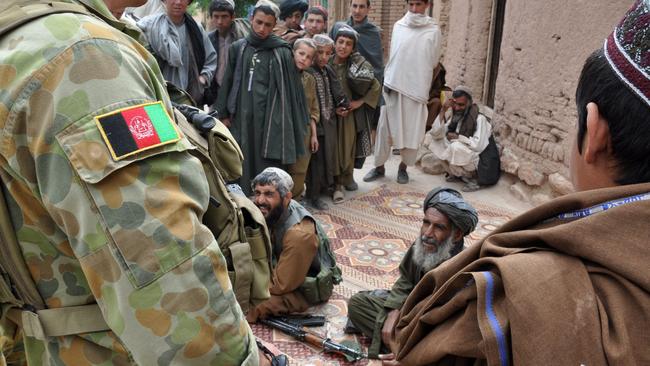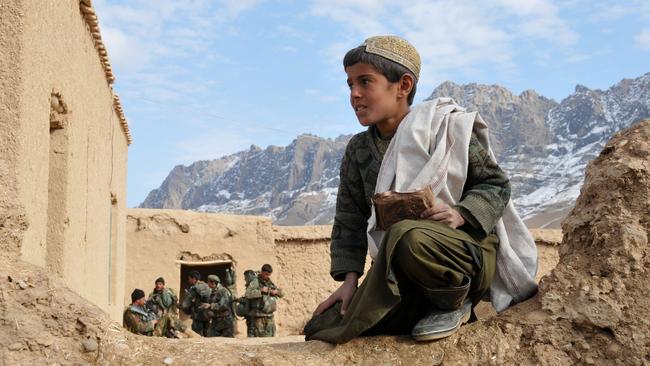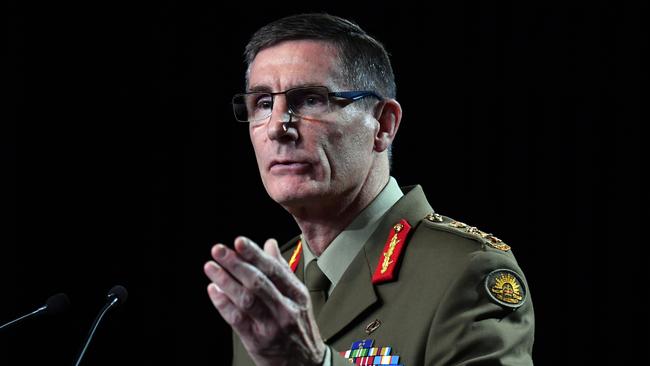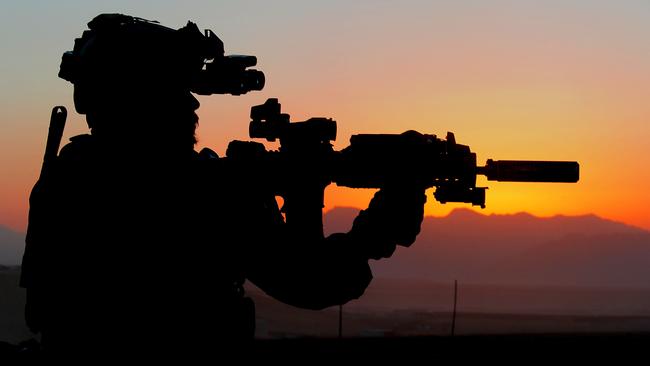Defence can’t find ‘identify or locate’ victims of alleged Special Forces’ war crimes
Defence has revealed it has failed to fulfill 15 recommendations outlined in the Brereton report into alleged crimes by Australian elite troops. See why.
National
Don't miss out on the headlines from National. Followed categories will be added to My News.
Exclusive: Defence has been unable to “identify or locate” the victims or their families owed compensation for alleged war crimes by Australian Special Forces in Afghanistan.
The Brereton report into alleged crimes by our elite troops made 15 recommendations to pay compensation to Afghani individuals, without requiring criminal liability to be established.
After more than two years of investigation since the November 2020 report was released, Defence now concedes there is little prospect to proceed while the Taliban remain in power.
The decision to make payments to restore “Australia’s standing” without liability admissions, is the last outstanding report recommendations from the contentious four-year-long inquiry.

The revelation is contained in department advice to Defence Minister Richard Marles who is attempting to close out the recommendations where the previous government failed to do.
But it is an indication of the challenges the secretive Office of the Special Investigator (OSI) is also facing as it attempts to gather critical testimony to make prosecutable cases against identified troops.
The OSI and Australian Federal Police are investigating at least 45 incidents involving 19 Special Forces soldiers from the SAS and the “unlawful” death of 39 people.
So far one person has been charged. There are cases against three others in their final stages for Commonwealth DPP review.

Defence has conceded the issue of compensation was complex from “a legal, practical and logistic point”, including “the fact that it is not safe or practicable to identify and locate individuals to whom compensation recommendations relate noting that the (Brereton) report did not provide sufficient identifying details”.
It also noted it was hamstrung by the lack of Australian diplomatic presence in Kabul, difficulty with shifting funds into the country due to the liquidity crisis and collapsed banking sector and “the sanctions and policy limitations applicable to any engagement with the Taliban”.
“No feasible options for making payments have been identified so far but Defence continues to work with Commonwealth agencies to explore options,” it concluded citing its work with the DFAT, Prime Minister & Cabinet and Attorney-General’s Department among others.

The August 2021 fall of Kabul to the Taliban deemed there to be “no viable options” to implement the remaining 15 of the 143 Brereton recommendations.
Defence has declined to comment on its conclusions.
Sources have suggested the payments were to be up to $10,000 for a death, less for injury and or property damage.
The US began making Afghani condolence payments in 2005 after a series of air strikes killed dozens of civilians. Between 2013 and 2016 alone it paid out US$1.2 million for 101 dead and 270 injured Afghanis. The British too reportedly made payments that equated to about $3000 per victim.
ALLEGED VICTIMS COULD BE TALIBAN, SYMPATHISERS: HAMILTON-SMITH
Opinion by Martin Hamilton-Smith
The government trying to pay compensation to alleged victims of our Special Forces is outrageous and a further indication of a presumption of guilt and the over-reaction to the allegations from the Chief of the Defence Force Angus Campbell and federal government.
These alleged victims – and let’s see what a criminal case may find – may well turn out to be Taliban or Taliban sympathisers, there is a question mark over whether the people who were allegedly killed unlawfully in Afghanistan were Taliban.
In other words, the people to whom they might be paying or trying to pay compensation may well turn out to be part of the force we were fighting and that is part of the problem in making assumptions before we can learn the truth.
And the only way the truth will be established will be in a criminal court and there has so far been only one charge laid. Justice delayed is justice denied so the sooner they get these charges out in the open and the soldiers have an opportunity to defend themselves the better.
One of the things that really upset the soldiers was the CDF in his opening remarks after the Brereton report was tabled was that we needed to apologise to our former enemies about these things that had been done.

The whole presumption that the allegations were true and that compensation had to be paid is really getting ahead of the facts there has been a rush to presume guilt.
The guerrilla force we were fighting in Afghanistan had a fighting force, an auxiliary and an underground. There were people with weapons in their hands, people bringing up the weapons and ammunition and storing and providing safe houses and people providing intelligence information to be used to kill Australians.
When you are fighting a guerrilla force they are very nebulas, who of those component forces of the guerrilla force were legitimate targets? If you are paying compensation to people who were part of the fighting force, part of the auxiliary or part of the underground, are you paying compensation to our former enemies? There are the dangers in rushing to pay compensation before you know the true facts.
Soldiers on the battlefield have a lot of issues they need to consider and that doesn’t justify for a moment doing anything unlawful but there are pressures people are under on the battlefield that need to be examined in a proper court in due process where all sides of the matter are put before a jury before judgments are passed.
If the OSI is going to charge anyone they should get on with it so that the truth can be established and all sides put.
* Martin Hamilton-Smith, Australian Special Air Service (SAS) Association national chairman and former SAS soldier.
More Coverage
Originally published as Defence can’t find ‘identify or locate’ victims of alleged Special Forces’ war crimes




